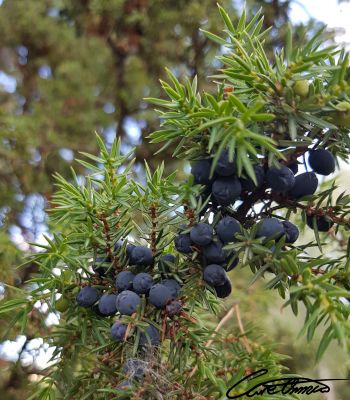What Are Juniper Berries Good For?

Juniper berries have been proven through research to contain beneficial substances that are good for you.
The research about juniper berries is lacking on the whole but there is some research that has shown some interesting results.
Most of the junipers are edible, but you can also find poisonous junipers.
You can eat the juniper berries as they are, but if you have a problem with your kidneys or other health issues you need to be careful.
Something I find amusing with the juniper berries is they aren’t berries, they are cones!
I’ve seen these bushes since I was a child. I was never fond of them, because of their sharp needles. They can really scratch you if you aren’t careful.
Where we live, many people have juniper berry bushes as hedges around their gardens.
Some have them as ornamental bushes. They also grow wild.
Who knows, those sharp needles might fend of an intruder or two as well.
Table of Contents
Benefits Of Juniper Berries
An extensive review was made on all research, journals and various books updating on Juniperus Communis as a medicinal plant. The research team listed a number of pharmacological activities and health benefits against various diseases.
Here’s some of the most interesting findings in the review.
Juniper berries are diuretic
Juniper berries increase the flow of urine. This can help to cleanse the system of excess fluids and stimulate the kidneys. This causes the body to flush out uric acid and excess crystals that can cause problems, for instance arthritis or kidney stones.
Juniper berries have anti-inflammatory properties
Anti-inflammatory is the property of a substance or treatment that reduces inflammation or swelling.
Juniperus communis shows anti-inflammatory properties but its level of activity varies quite a lot. This means that more research is needed to establish if and how we could be able to benefit from it.
Juniper berries have antifungal properties
With antifungal activity means a compound that is destroying fungi or inhibiting their growth.
The essential oils obtained from Juniperus communis show antifungal activity against two tested fungi, Rhizoctonia solani and Rhizopus stolonifer.
Rhizoctonia solani causes a wide range of commercially significant plant diseases. Many countries experience great food losses caused by this fungi every year.
Rhizopus stolonifer, also known as black bread mold, is a common agent of decomposition of stored foods.
Juniper berries have analgesic properties
Analgesics are agents which selectively relieve pain by acting in the central nervous system and peripheral pain mediators.
Methanolic extract of Juniperus communis have been reported to contain analgesic properties.
Juniper berries are antidiabetic
An antidiabetic agent is any substance that helps people with diabetes control the level of sugar in their blood.
Methanolic extract of Juniperus communis shows a significant antidiabetic activity, which needs further research.
Juniper berries have antihyperlipidemic properties
Antihyperlipidemic agents promote reduction of lipid levels in the blood. This means that it lowers the level of cholesterol in the blood by reducing the production of cholesterol by the liver.
Methanolic extract of Juniperus communis shows a significant antihyperlipidemic activity.
Juniper berries have antimicrobial properties
An antimicrobial is an agent that kills or stops the growth of microorganisms.
The berries of Juniperus communis were reported to have antimicrobial properties and volatile oils. These studies show that Juniperus communis was active against bacteria like, Escherichia coli, Staphylococcus aureus, and Hafnia alvei.
Juniper berries have antioxidant properties
Antioxidants are compounds that inhibit oxidation. Antioxidant activity is defined “as a limitation of the oxidation of proteins, lipids, DNA or other molecules that occurs by blocking the propagation stage in oxidative chain reactions”
The antioxidant effects of the juniper berry oil of Juniperus communis was confirmed by a study and created the possibility of blocking the oxidation processes in yeast cells by increasing the activity of the antioxidant enzymes.
Juniper berries have antibacterial properties
Antibacterial is anything that destroys bacteria or suppresses their growth or their ability to reproduce. Heat, chemicals such as chlorine, and antibiotic drugs all have antibacterial properties.
It’s been estimated that extracts of leaves of Juniperus communis are effective against some pathogenic bacteria.
The methanolic extract of Juniperus communis was found to be very effective as compared to standard antibiotics.
Juniper berries shows neuroprotective properties in Parkinson's disease
The term neuroprotection comes from the Greek word 'neuron', meaning nerve cell, and 'protection'. It refers to mechanisms within the nervous system which protect neurons from degeneration.
In the context of Parkinson's, neuroprotection refers to any intervention which prevents or slows the death of dopamine-producing cells.
Neuroprotective activity of Juniperus communis was evaluated in chlorpromazine induced Parkinson's model in rats. Juniperus communis showed a significant neuroprotective effect against induced Parkinson's like symptoms. (source ◳)
As you can see above Juniper berries show quite a lot of interesting properties. We can conclude that Juniperus communis shows promise as a medicinal plant. But there needs to be more research done.
How Is Juniper Berries Used? (Medicinal Uses)
Juniper berries are said to have antiseptic capabilities and are therefore believed to help with urinary tract infections and cystitis.
It's also said that the berries can increase blood circulation in the skin. This is believed to make junipers berries good for various skin problems such as oily skin or eczema. Better blood circulation also contributes to better healing.
During the Middle Ages, juniper berries were considered to have magical healing power, and even today, juniper berries are sometimes used to increase appetite.
In traditional medicine, the juniper berries are used primarily as a medicine against urinary tract infections and are included in several blood treatment cures.
The medicine was also prescribed for impaired renal function to increase the secretion of urinary substances. Juniper berries have a strong effect on kidneys. But juniper berries are no longer recommended for the treatment of various disorders when the patients have an underlying renal cause. (source ◳)
In Swedish traditional medicine, juniper berries were boiled in water or milk and used as a cure for pertussis or whooping cough. It's still somewhat common to make a cup of juniper berry tea to alleviate symptoms of a cold or cough.
If you’re interested in how you make a cup of tea for your cough, you can read our article Juniper Berry Tea: Potent Benefits, But Not For Everyone.
Gin and its predecessor Genever were manufactured in the Netherlands in the 16th century to treat kidney problems, gallstones, and gout.
The Genever is called the "big sister" of the gin and is oilier and less spicy than the drier gin. It's from the dutch word Genever that gin got its name.
A Warning About Juniper Berries
Avoid juniper berries and juniper berry oil if you have severe kidney problems, such as kidney inflammation. Even at normal doses, juniper berries have a strong effect on the kidneys and can cause increased stress on them.
The National Kidney Foundation is warning patients with kidney problems ◳.
Seizures and kidney damage have been reported in individuals who took more than 10 g of Juniper per day or who took high doses of Juniper for longer than 4 weeks. The way and form of administration are however not specified. (source ◳)
Pregnant women should not use juniper berries or juniper oil since it can cause contractions in the uterus. (source ◳)
People with high blood pressure should also avoid juniper berries. Read more here ◳.
Excessive use of juniper berries or continued use may produce renal irritant effect particularly when the urinary tract is inflamed. Therefore, the medicinal use of juniper is no longer recommended for the treatment of various disorders, when the patients have an underlying renal cause. (source ◳)
We've written about different kinds of alternatives to Juniper if you want to learn about the substitutes for most of its uses.
Conclusion: Juniper Offers Some Impressive Benefits But Be Careful
I'm glad I researched more about this berry that I earlier knew so little about. Juniper berries are great to use as a spice, with its unique taste.
Juniper berries can also be good for you though they are beveled to have antiseptic capabilities and therefore might help you with various problems, like for instance urinary tract infections. You just need to be careful when using the berries. Don't overdo it!
Juniper bushes are not hard to find, I'll most definitely both take notice and appreciate them more from now on. Just remember to be careful if you are about to pick them because the junipers needles are very sharp.
You can always gather some fallen branches to keep inside. The fragrance from the Juniper gives a lovely aromatic scent. As a bonus, as they believed in the old days, you might get rid of some evil spirits!
Are juniper berries edible or poisonous?
Juniper berries from the plant Juniperus communis
are edible. Other varieties of juniper berries are considered too bitter to eat. But beware of the variety Juniperus sabina
also known as Savin Juniper! Because she’s toxic and consumption is inadvisable. Do not consume juniper berries if you have any kind of kidney problems.
What are juniper berries good for?
Juniper berries are believed to have antiseptic capabilities, be able to increase blood circulation, increase your appetite and even cure whooping cough. A long time ago juniper berries were even believed to have magical healing powers!
What do the juniper berries taste like?
Juniper berries have a musty flavor with a deep aromatic sweetness. Its taste can be described as a piney taste with some pepper and citrus elements. If you’ve ever tasted gin you have a good idea of what juniper berries taste like.
What can you do with juniper berries?
Juniper berries are most commonly used as a spice. Juniper berries are especially well suited together with foods like game with stronger flavors than regular pork or chicken. It’s also used to flavor spirits, most commonly, gin. You can also use the junipers wood and needles for smoking meat products.



 TM
TM